As we look back on 2021, we see the devastation wrought by two interrelated pandemics—COVID-19 and white supremacy—across this country and the world. In response to these pandemics, we’ve also seen major growth in our movement ecosystem—through relationship-building, shared struggle, and solidarity.
At SVA, we’ve been called to expand our investment of resources and infrastructure for frontline organizing. Our Sponsored Projects Program has grown to support 22 projects, including 9 new groups. We’ve gotten to work with hundreds of others across North Carolina and beyond, providing financial and capacity support. Looking ahead to 2022, we’re excited to launch a redesigned People’s Solidarity Hub in Durham, and kickstart similar hubs across the South—all to help anchor growing movement ecosystems.
We reached out to organizations in SVA’s network of sponsored projects and grantees to share their reflections from the past year and visions for the new year. We asked: Are there particular challenges you’ve faced, advances you’ve made, or lessons you’ve learned in 2021? And what do you see as the biggest priority for our movements going into 2022?
Nollie Jenkins Family Center (Durant, MS), FLF Solidarity Grantee
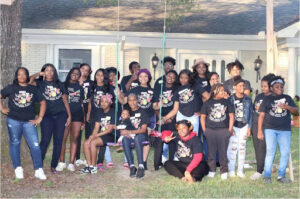
NJFC’s Youth Leadership Team hosted a 3 day youth summit as part of their Annual Week of Action Against School Pushout.
2021 reflections: Over the past year, Nollie Jenkins Family Center has transitioned from running a localcampaign to abolish corporal punishment in the Holmes County Consolidated School District to coordinating a state-wide coalition of groups organizing to end corporal punishment in public and charter schools in Mississippi.
The logistics of coordinating this group of organizations has created some challenges. However, the greatest challenge that we have faced over the past year is the fact that corporal punishment is so entrenched in the community. In the course of our work, we learned that corporal punishment is more prevalent in counties with “pronounced histories of violent racialized social control.” Additionally, corporal punishment receives the sanction of one of the most powerful organizations: the church.
Highly patriarchal, the most popular church in our community preaches the gospel when it comes to corporal punishment: “Foolishness is bound up in the heart of the child, but the rod of correction will drive it far from him” (Proverbs 22:15) and “Bow down his neck while he is young, and beat him on the sides while he is a child, lest he wax stubborn, and be disobedient unto thee, and so bring sorrow to thine heart” (Ecclesiasticus 30:12). A combination of these two factors makes it difficult to move the needle on corporal punishment in the community.
2022 visions: Our biggest priority going into 2022 is to spend time in the community listening to people talk about their experiences with corporal punishment. The evidence supporting the abolition of corporal punishment is overwhelming. In Report on Physical Punishment in the United States: What Research Tells Us About Its Effects on Children, Elizabeth Gershoff synthesizes “one hundred years of social science research and many hundreds of published studies on physical punishment conducted by professionals in the fields of psychology, medicine, education, social work, and sociology, among other professions” and found that corporal punishment is an ineffective practice. However, we would like to collect more qualitative data about why the community chooses to continue this practice. As community organizers, we recognize the need to meet the community where it is so that we can build the trust necessary to have the conversations about the negative effects of corporal punishment on children and young people and about the more healthy and beneficial alternatives that exist for discipline.
Southern Workers Assembly (regional), Sponsored Project
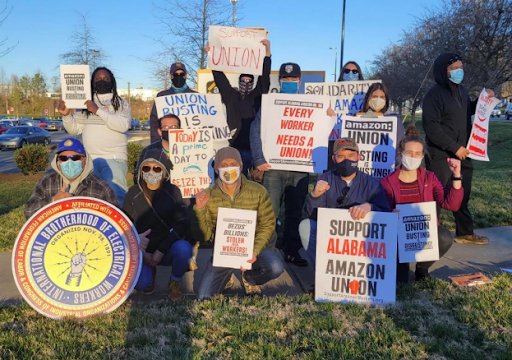
Solidarity with Amazon workers in Bessemer, AL, from across the South and the country.
2021: In late 2020, in the midst of the COVID-19 pandemic, workers at an Amazon warehouse in Bessemer, Alabama contacted the Retail, Wholesale, and Department Store Union (RWDSU) to begin a historic organizing campaign at the facility. Recognizing the gravity and significance of this campaign and shed light on the egregious anti-union campaign that Amazon was engaged in, we initiated a national day of solidarity with the organizing drive on February 20. More than 52 cities across the United States, including 22 in the South, held actions on that day at Amazon warehouses, Whole Foods, and other significant locations to demonstrate solidarity with the workers in Bessemer. Upwards of 3,000 people participated in the actions, and over 1,000 new contacts were made.
The SWA engaged in a series of focused followup, assessment, and discussion of next steps with organizers of the Southern actions following February 20 to strengthen relationships with these organizers for the longer term work to build local workers assemblies and foster greater contact among worker organizing efforts in the region. From those discussions, a four part virtual worker school was initiated that took place from late April to June 2021. More than 200 Southern workers registered to participate in the school.
Prior to the school, there were efforts to develop local workers assemblies in 2 Southern cities. The school strengthened these existing efforts, and gave rise to the emergence of newly formed local workers assemblies in an additional 7 Southern cities. Additionally, there are now Amazon workplace committees in several Amazon facilities across the South that the SWA is helping to develop.
2022: To consolidate, strengthen, and further develop our work, the SWA is currently preparing to launch an organizing fellowship program that draws from the ranks of the local assembly to provide additional training, support and structure to the work of the local assemblies. Each assembly and industry identified a candidate to participate in this process, who will commit an additional 10-15 hours each week to the many tasks to build the assemblies, participate in weekly team meetings consisting of political education and practical skills development, and meet regularly with a member of the SWA Coordinating Committee to produce and follow a work plan over the next six months.
A three part school for these candidates began in mid-November and is wrapping up this month. Following the conclusion of the school, 9 candidates will be selected to participate in this fellowship, which begins in January 2022 and runs through June. Each of those selected will additionally receive a small stipend to support their work.
Youth OUTright WNC (Asheville, NC), Queer Mobilization Fund Grantee
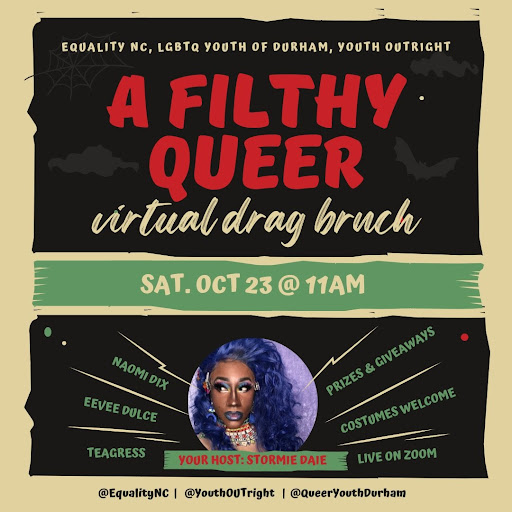 2021 reflections: Like many folks, we’ve certainly faced challenges due to COVID, including virtual burn out. Youth simply are tired of being on Zoom and Discord all the time! We’ve learned that providing ways to plug our bodies into our time together makes a big difference. Whether that’s mailing art supplies home, or doing some form of movement activity together on Zoom, the more we can engage our FULL physical, mental and emotional bodies, the more resilient we will be as a community!
2021 reflections: Like many folks, we’ve certainly faced challenges due to COVID, including virtual burn out. Youth simply are tired of being on Zoom and Discord all the time! We’ve learned that providing ways to plug our bodies into our time together makes a big difference. Whether that’s mailing art supplies home, or doing some form of movement activity together on Zoom, the more we can engage our FULL physical, mental and emotional bodies, the more resilient we will be as a community!
We are continuing to deepen our learning around relationship building. We have big aspirations and sometimes high expectations of ourselves! We’re learning that in order to forge the kind of relationships we want, ones built in trust and collaboration, we really have to take our time to do things right. Whether working with local public schools, other youth organizations that serve a different and intersecting marginalized youth community, our state and local representatives, or the community at large.
As our organization grows, one conundrum we find ourselves in is finding the appropriate balance. For example, this year, we onboarded our first ever Fund Development Director! This is fantastic progress and growth for the organization. It helps us grow our capacity to not just fundraise, but to be visible and accessible to the community. We’ve been leaning into this new growth, and that means we have to strike a balance between building organizational infrastructure that didn’t exist before, refining existing financial tracking processes, creating new fundraising strategies, and the very necessary work of creating new relationships and inviting folks to support our mission financially.
2022 visions: Moving into 2022 is an exciting time! Our biggest priority is ensuring the safety and health of the youth in our community. To that end, we are continuing our Healing Circle series with Southern Soul Wellness, designed to equip young people with healing tools to continue caring for themselves and others. Additionally we are working with our statewide GSA Network to better understand school climate from the student perspective so that we can offer the appropriate support to administration and faculty. Currently, we have some consent education content in development that will be featured on our instagram reels, as well as a community survey for youth focused on overdose risk and attitudes towards drugs and drug use. All of these efforts are to build out support and educational networks for our youth community to thrive in!
Internally, we simply need to sustain the incredible growth we’ve seen over the past year and a half. This is the first time Youth OUTright has ever had a true staff TEAM, a full time Executive Director, full time Programs Manager, and full time Fund Development Director as well as two part time youth staffers. We’re incredibly proud to have built such a robust team! This means we will continue to invest in growing our grassroots base of support and working with our community, both locally and nationally to ensure sustainable resources and support for LGBTQIA+ youth in Western North Carolina.
BAMA Kids (Camden, AL), FLF Solidarity Grantee
BAMA Kids hosts their Christmas party and Positive Pathway 21st Century youth leadership meeting all in one day!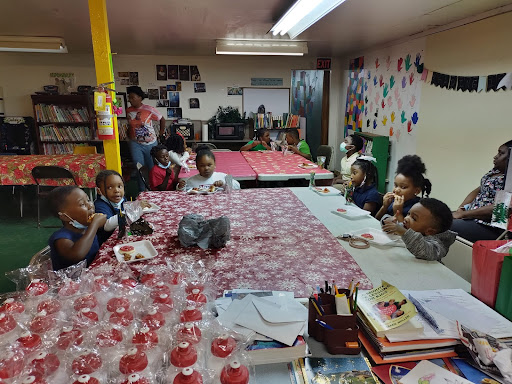
We have been able to keep our alliances and partnerships strong with many of our core movement partners. We have been doing a great deal of work with Southern Black Girls and Women’s Consortium and SRBWI (Southern Rural Black Women’s Initiative). BAMA Kids participants were able to apply for Black Girls Joy Challenges through Southern Black Girls and Women’s Consortium.
2022 visions: As a community based non-profit working with children and families who are underserved, our biggest priority is to continue to energize and educate parents and stakeholders about their power, stories, voices. We want to continue to teach mothers and women to advocate for themselves and their children. We want to continue to remind them that elected officials are elected into their positions—and should be answerable to the hardships they encounter on a daily basis. It is important for citizens who lack everyday essential needs to know that they have to power to mobilize and request the assistance they need.
We know that it is also important to teach advocacy to our young people and create in them a desire to create change in their communities. In BAMA Kids, we often talk about how important it is to advocate for what is right and to advocate for change. This is a reality that must be learned early in life, especially for those who live in underserved communities and who are often over looked and marginalized. BAMA Kids participants participate in civic engagement activities and are given the tools they need to engage with their community and voice their needs. We nurture their growth and encourage them to remain engaged in civic responsibility.
Durham Beyond Policing (Durham, NC), Sponsored Project
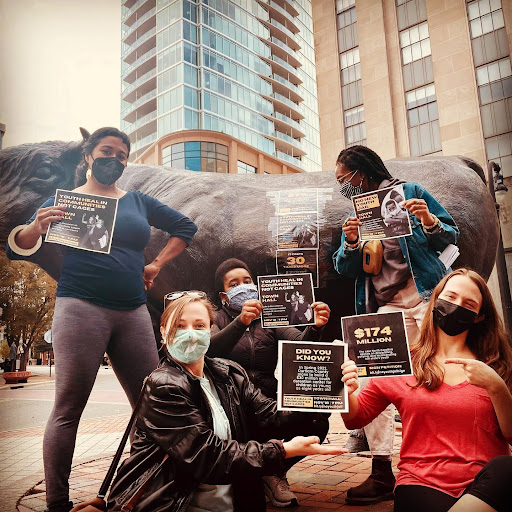 2021 reflections: This year, DBP learned painful lessons about how hard it can be to transform a movement moment into actual policy change, and also practical lessons about what it takes to drive momentum into work that actuates the shifts our people urgently need. We learned about community building, group cohesion, and staying true through ebbs, flows, and powerholder backlash. We learned that it is possible to organize mostly-remotely, and then come together masked at a park or bonfire and experience brief pulses of warmth and connection in real life and real time.
2021 reflections: This year, DBP learned painful lessons about how hard it can be to transform a movement moment into actual policy change, and also practical lessons about what it takes to drive momentum into work that actuates the shifts our people urgently need. We learned about community building, group cohesion, and staying true through ebbs, flows, and powerholder backlash. We learned that it is possible to organize mostly-remotely, and then come together masked at a park or bonfire and experience brief pulses of warmth and connection in real life and real time.
During the 10 to Transform campaign, we fought hard alongside our coalition partner Durham For All to persuade the Durham City Council to reallocate vacancies from Durham Police Department (DPD) into the new Department of Community Safety to hire unarmed, skilled, compassionate crisis responders. We won the reallocation of five vacancies in the 2021-22 City budget, and fifteen more vacancies were frozen within the DPD budget with a plan to revisit the vote this January 2023. If the Council does not reallocate these vacancies, they will remain in the 90-vacancy pool that DPD would use to hire patrol officers. We also persuaded the Durham County Commissioners to add a million dollars to the Mental Health line item in the 2021-22 County budget but we were unsuccessful in reducing the jail budget, despite the fact that the jail population has declined, hovering around 50% of capacity.
In September 2019 Durham Beyond Policing won the creation of the Community Safety and Wellness Task Force, a joint taskforce between City, County, and School Board to examine the public safety and wellness needs of Durham residents and communities and provide recommendations for additional programs to enhance safety and wellness that rely on community-based prevention, intervention, and re-entry services as alternatives to policing and the criminal legal system. The Community Safety and Wellness Task Force began in April 2021 and we’ve been following its progress and successes.
We joined forces with EPiC Empowered Parents in Community, Advancement Project, Duke Children’s Law Clinic, Southern Coalition for Social Justice, youth leaders, and many other community members to oppose the construction of a new and significantly expanded youth jail in Durham County. Set to be built in 2022 at a price tag of $30 million public dollars, this facility would lock up primarily Black children and youth 8-17 and separate them from their families as they await sentencing.
DBP is committed to transformative justice, which for us means transforming racist and oppressive systems while building our own community-led structures to address harm and resolve conflict. We’ve been practicing transformative justice skills within our formation and learning as we grow. We held the first of a series of Transformative Justice 101 workshops this fall with the leadership of UNC Social Work student intern Naana Ewool and outreach organizer Faye Koenigsmark.
2022 visions: Next year, our biggest priority will be engaging in relational organizing, popular education, and participatory action research with our communities to transform the narrative around policing and incarceration in Durham and to co-create the solutions we need.
864Pride (Greer, SC), Queer Mobilization Fund Grantee
Grand Opening of the Queer Wellness Center
We have witnessed first hand the power of folx coming together as a community across organizations, systems, cultural backgrounds, beliefs, levels of education, and experience uniting under the same mission to make the impossible possible. We have learned that great personal risk is sometimes required. We have learned to lean on each other’s courage and determination to keep pressing forward regardless of certainty on how things will turn out. We have learned that we do not have to be perfect nor do we have to agree on everything to be able to accomplish great things together. Finally, we have learned that the power of love that binds us together as a community is more powerful than the wounds we may have sustained along the way.
2022 visions: As we look forward into 2022 we plan to launch our Medical Program where folx from the queer community are able to access free medical services through our growing group of affirmative Primary Care Physicians, Psychiatrists, and Nurses. We will develop our Crisis Management Program to provide crisis therapy and case management services to any individual who walks through the doors of the Queer Wellness Center. We will also launch our research team to begin the process of developing evidence based health care services and published works.
Robeson County Cooperative for Sustainable Development (Lumberton, NC), Sponsored Project
Rev Mac Legerton, Co-Director, Robeson County Cooperative for Sustainable Development speaks at #peoplevsfossilfuels
The goal of the Survival School is to organize grassroots and professional residents in our rural communities and facilitate an empowering process that addresses the major community issues as identified by the people themselves. The School has a particular focus on hurricane and climate related issues such as housing and re-visioning community futures. The focus of the School is on all issues that negatively impact the community in major ways because, from the community’s experience, these are all disasters and critical, not only to survival but also to systems change.
2022 visions: Our local Disaster Survival School is a part of Southern Vision Alliance’s Statewide Disaster Survival and Resiliency School. The plan is to create a statewide base of organized influence for improving disaster systems and responses on the state level and expand the local Survival School model into other counties.
NoCap (Durham, NC), SVA Program
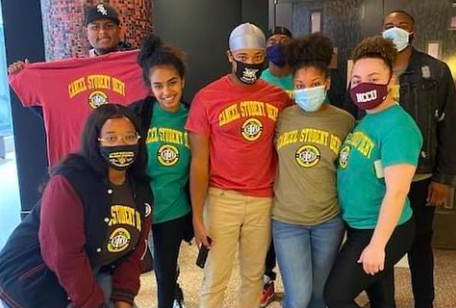
NoCap fellows from the Triangle and Triad get on the bus to DC to cancel student debt.
Our biggest priority moving into 2022 is to keep our foot on the gas—building our base, pushing for the cancellation of all student debt, growing our community programs, and continuing to meet people where they are and not where we expect them to be. Our motto moving into 2022: “I am because WE are.”
